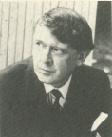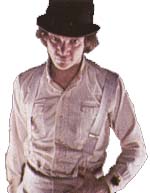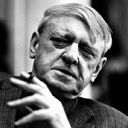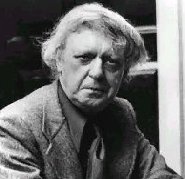 Anthony Burgess Anthony Burgess
(1917- 1993)
Dark and powerful, A Clockwork Orange is written
in an artificial language that owes something to Russian but most of all to Burgess's
uninhibited experimentation with language. The brutality depicted in A Clockwork Orange emerged after an assault on Burgess's first wife Lynne in 1943 by American GI's in London, that resulted in the loss of their expected child. The movie version of the novel, directed by Stanley Kubrick in 1971, encountered heavy criticism - some of its violent scenes were said to have inspired real-life violence by gangs of hoodlums - and was eventually withdrawn by its producers and distributors. After graduating from Manchester University in 1940, Burgess (born John Anthony Burgess Wilson in 1917 into an impoverished Catholic Lancashire family) joined the British Army
Education Corps where he served as musical director of a special services unit,
entertaining troops in Europe. Burgess regained his health, but his wife died in 1968. He remarried to Liana, an Italian countess, a translator of Pynchon's V and Lawrence Durrell's Alexandrian Quartet. Anthony, Liana and their son Andrea (Andrew) went to live first on Malta, then in Rome, in Switzerland, and in Monaco. Between 1970 and 1973 Burgess was a visiting fellow at Princeton and a distinguished professor at the City College of New York. He didn't ever stop writing, moving easily from genre to genre - farcical comedy in Honey for the Bears, gritty English provincial realism in The Worm and the Ring and, most famously, the Enderby series, which "are even finer comedies than
those by the so much admired E. Waugh" (Gore Vidal). "It was the afternoon of my eighty-first birthday, and I was in bed with my catamite when Ali announced that the archibishop had come to see me." Anthony Burgess wished people viewed him as a musician who writes novels instead of as a novelist who writes music. "Music is a purer art because it has no direct relationship to human events. It's totally outside the field of moral judgment. That's why I prize it." He once professed surprise about his reputation as a prolific writer of comic novels. Anthony Burgess died November 26, 1993, in London Hospital, and is buried in Monte Carlo. |
Literae | B.S. Johnson | Neil Young | Pink Floyd | Bob Dylan | Cinema Posters


